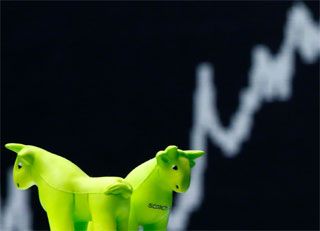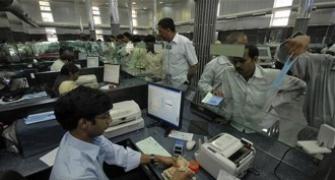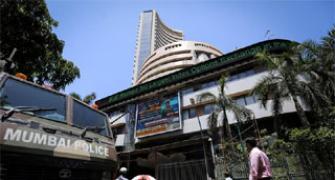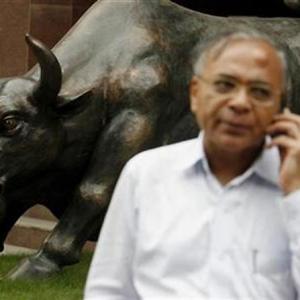Benchmark indices gain 30% this year, buoyed by global liquidity, new government
 India’s stock market is set to deliver the best returns in five years, buoyed by robust buying from foreign investors and euphoria surrounding a new government coming to power at the Centre. This year, the BSE Sensex added 6,232 points, or 29.4 per cent, while the broader National Stock Exchange Nifty gained about 2,000 points, or 31 per cent — the most since 2009, when the indices had risen about 80 per cent each.
India’s stock market is set to deliver the best returns in five years, buoyed by robust buying from foreign investors and euphoria surrounding a new government coming to power at the Centre. This year, the BSE Sensex added 6,232 points, or 29.4 per cent, while the broader National Stock Exchange Nifty gained about 2,000 points, or 31 per cent — the most since 2009, when the indices had risen about 80 per cent each.
While the markets had seen a ‘V-shaped’ recovery in 2009, following the global financial crisis, the returns this year have largely been in anticipation of a reversal in the macroeconomic environment, led by a reforms-oriented leadership at the Centre.
“This year, Narendra Modi has been the biggest factor,” said Motilal Oswal, chairman and managing director of Motilal Oswal Financial Services. “The reform process started by the new government and the drop in crude oil prices are big positives for the market.”
In what was touted as a “pre-election rally”, the market rally this year started in early February, when the Sensex was slightly below 20,000. Ahead of the election results on May 16, the rally gathered pace. A decisive mandate for the Modi-led Bharatiya Janta Party saw the gains spreading from blue-chip stocks to smaller counters.
An improvement in macroeconomic conditions — a fall in inflation and stabilisation of the rupee — coupled with an initial set of reforms announced by the government, aided the markets.
Buoyed by easy global liquidity on account of stimulus packages by central banks around the world, foreign institutional investors pumped in $16 billion into the Indian stock market this year, one of the highest in Asia.
In the past few weeks, however, the Indian market has fallen about five per cent from its peak levels, owing to a reversal in investor sentiment, following a sharp drop in crude oil prices. This raised concern about the health of the global economy.
On Tuesday, the Sensex ended at 27,403, about 1,300 points below its all-time closing high of 28,693 on November 28.
Intermittent corrections notwithstanding, most analysts expect the Indian market, which has given positive returns in five of the past six years, to continue with its positive run next year. “2015 will be a good year for Indian equities. My hopes are based on a likely significant increase in corporate earnings, stability on the political front and softening crude oil and commodity prices,” said Nirmal Jain, chairman, IIFL Holdings.
High valuations, however, are expected to limit the gains. The Sensex is valued at about 15 times its one-year forward earnings estimate, much higher than its long-term average and the valuation of the MSCI Emerging Markets Index.
This year, banking and financial stocks contributed to most of the gains of the Sensex. ICICI Bank, HDFC Bank, HDFC, State Bank of India and Axis Bank were the top five contributors to the Sensex, accounting for about half of its gains. Reliance Industries, Tata Steel, Tata Power and Wipro were the only four Sensex components to have delivered negative returns this year.










